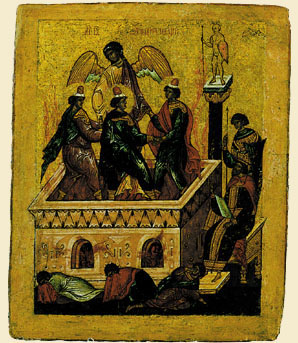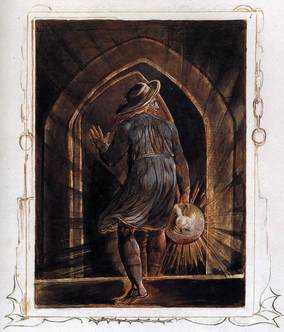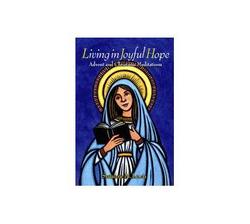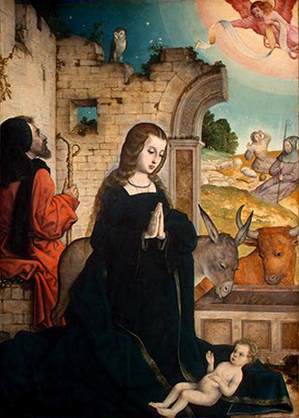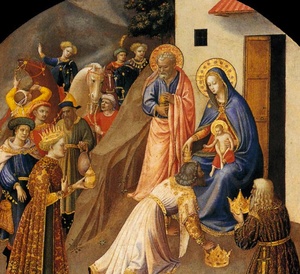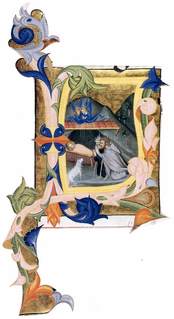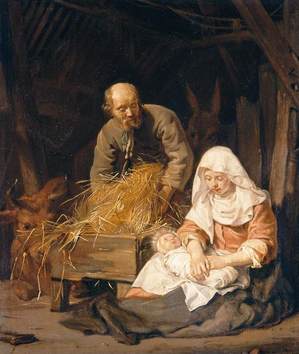We all are hurting today. Whatever the reason, joy seems to be lacking in many. For some people any celebration of Christmas is out of the question. They believe that joy is not permitted due to the murders of children and adults. There is no room for hope, no possible way to feel anything but misery. There is no question that the radical absence of loved ones is very trying and almost hopeless. I think we can understand this line of thinking, but I think for people of true Christian faith this is not the answer.
Category: Advent & Christmastide
Fasting to prepare for Christmas
Latin Catholics are accustomed to fasting once a year
at Lent. Historically speaking, there was a time when the tradition of fasting
was proposed a few more times a year than merely Lent, e.g., the Assumption fast, the Saints’ fast and the Advent
fast.
also of Mary (Assumption of the BVM) was preceded by a distinct time of preparation: prayer, fasting almsgiving.
of abstinence on Fridays. Fasting and abstinence are different; do you know the
difference? What can we do to restore a reasonable practice of the Catholic faith that includes expanding our utilization of spiritual disciplines such as fasting? Can Catholics reinstitute the Ember Days in the praying of the Novus Ordo Liturgy?
The Greater Antiphons, the Church’s prophetic utterances…
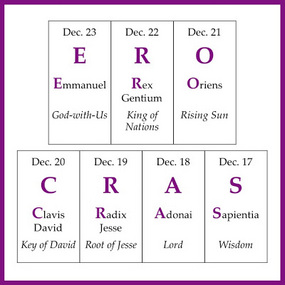 The tradition of the “O Antiphons” is now upon us. We will hear them beginning tonight at Vespers.
The tradition of the “O Antiphons” is now upon us. We will hear them beginning tonight at Vespers.
night, a biblical verse from the Advent Prophets Isaiah and Micah (that is, an “antiphon”)
that is known to be prophetic of the birth of Jesus; each notes a title of the
Messiah. Each offers us a key to understand the gift of the Messiah promised through the use of typology.
Seven different antiphons are traditionally sung prior to and following the
Magnificat during Vespers as part of the Divine Office (the Liturgy of the
Hours). The eighth day of the octave is Christmas Eve, so Vespers for that
evening is the Christmas Vigil. Each antiphon begins with the word, “O” in the
incipit. Hence, “O Antiphons.”
Most of us are familiar with the Advent hymn, “O Come, O Come,
Emmanuel,” the content of which the O Antiphons form the structure Vespers at
this time of the liturgical year.
says and since in our theology we derive our belief from the manner in which we
pray, the O Antiphons give ample food for what we belief the Messiah to be, who
he is. Secularism gives the world an emasculated Santa Claus but the Church
gives us a Messiah. He is known through his titles, that is, his activities. In
the final stretch before Christmas use this time to pray with the O Antiphons:
they provide a beautiful framework for reflection before the Nativity.
Advent Three, Gaudete
Our worship of God began today with the Church quoting Saint Paul who wrote, “Rejoice in the Lord always; again I say rejoice. Indeed, the Lord is near” (Phil. 4:4-5).
Hard to hear these words today following the tragic events of Friday the 14th where the citizens in Newtown, Connecticut, indeed, the nation, faced horrific acts of evil. As we “faithfully await the feast of the Lord’s Nativity” our affect, our prayer, our humanity has a new orientation, a new recognition: a cry of anguish and a cry of joy. That’s the Christian paradox. We are sad (troubled and grieved) to have young people gunned down. Lives cut short. The living who are searching for ways to go on with meaning and peace. The somber joy of the Third Sunday of Advent is an invitation, a recognition, a way being, to a life of joy found only in God no matter the circumstance.
Advent, like every day of our liturgical lives is call to be aware of God; to be reawakened to the movements of grace in the depths of our being.
The Liturgy concludes with the petition that the divine gifts received in the Eucharist “cleanse us of our faults and prepare us for the coming feasts.” That’s the challenge we all face together: to begin our conversion with the awareness that sin can have deleterious effects in each of us if not attended to. What can be said of Adam Lanza with his crime, personal sin and affective disorder can happen to each of us. There is that line that’s sometimes helpful to remember: There I go but for Christ’s grace. The measure of life is not our passion but the Mystery of Christ.
The anxiety of these days is mitigated by what the Lord does in our hearts: He loves us.
I noticed in the first Scripture reading for today’s Mass the phrase: the Lord is near. It ought to echo for you where you hear the Great O Antiphon, O Emmanuel, God with us. Is that our belief? Is there a true awareness that the Lord is near in the way we live our lives in the particular circumstances in which we find ourselves? Are there concrete ways that we recognize the nearness of the Lord in His gift of the Holy Eucharist, in the proclamation of the Word, in lectio divina, in the community of faith that worships and does works of charity?
Advent’s First Sunday
At the Sunday Angelus today, the Holy Father notes some crucial points about our Christian faith that can’t go unheard and need to be savored deeply in the heart. Notice, please, that Benedict doesn’t talk about expectation but he does speak of the Lord’s coming and presence; his death and resurrection and our final destiny (that is, love) and doesn’t mention the Christ Child as the exclusive image of Advent. The Cross, resurrection and ascension is our only Hope. Pope Benedict addressed the faithful with the following:
Today the Church begins a new liturgical year, a path that is further enriched by the Year of Faith, 50 years since the opening of the Second Vatican Council. The first Time of this journey is Advent, composed, in the Roman Rite, of the four weeks that precede the Birth of the Lord, that is, the mystery of the Incarnation. The word “Advent” means “coming” or “presence.” In the ancient world, it signified the coming of the king or the emperor into one of the provinces; in the language of Christians, it referred to the coming of God, to His presence in the world; a mystery that involves the whole of the cosmos and of history, but that recognises two culminating moments: the first and the second coming of Jesus Christ. The first is the Incarnation itself; the second is the glorious return at the end of time. These two moments, chronologically distant – and it is not given to us to know how far apart they are – touch us deeply, because by His death and resurrection Jesus has already accomplished that transformation of humanity and of the cosmos that is the final goal of creation. But before that end, it is necessary that the Gospel be proclaimed to all nations, as Jesus says in the Gospel of Saint Mark. The coming of Christ is continuous; the world must be infused by His presence. This permanent coming of the Lord in the proclamation of the Gospel requires our continual collaboration; and the Church, which is like the Betrothed, the promised Bride of the crucified and risen Lamb of God (cfr. Rev. 21,9), in communion with her Lord collaborates in this coming of the Lord, in which His glorious return is already begun.
It is to this that the Word of God recalls us today, tracing out a line of conduct to pursue in order to be ready for the coming of the Lord. In the Gospel of Luke, Jesus says to the disciples: “Beware that your hearts do not become drowsy from carousing and drunkenness and the anxieties of daily life . . . Be vigilant at all times and pray.” So: simplicity and prayer. And the apostle Paul adds the invitation to “increase and abound in love” among ourselves and towards everyone, to strengthen our hearts and to be blameless in holiness (cfr. 1 Thess 3, 12-13). In the midst of the turmoil of the world, or the desert of indifference and materialism, Christians accept the salvation of God and witness to it by a different way of life, as a city set on a hill. “In those days,” the prophet Jeremiah proclaims, “Jerusalem shall dwell safely; this is the name they shall call her: ‘The Lord our justice'” (Jer 33,16). The community of believers is a sign of the love of God, of His justice that is already present and working in history, but not yet fully realised, and that therefore should always be awaited, invoked, and sought after with patience and courage.
The Virgin Mary perfectly embodies the spirit of Advent, which consists of listening to God, a profound desire to do His will, and joyful service to others. Let us be guided by her, so that God who is coming may not find us closed or distracted, but might extend to each of us a small part of His kingdom of love, of justice, and of peace.
Living in Joyful Hope
During Advent and Christmas we await and celebrate
the birth of Christ in order to tune our hearts to await and celebrate the
fulfillment of God’s “plan for the fullness of time, together up all things in
Christ, things in heaven and things on earth.” Ephesians 1:10. What better way
to tune our hearts than by listening, with great care and attention to the work
of God?
verses from the Bible with reflections and prayers to serve as a springboard
for our personal reflection on the Word of God. Suzanne’s mediations are based on the theology of the Catechesis of the Good Shepherd. Follow the link above.
The temptation of Christmas
Have we finished the Christmas season in good order? Have we exceeded our expectation to live the season of Christmas differently from what secular culture has given us? Or, have we given up and just given ourselves over to the mediocrity of the the world around us with regard to Christian Faith? What follows is a very interesting commentary on our Christian observance of the Birth of Jesus, the Nativity of God-Man by Father Julián Carrón. While the today brings to a close the Church’s yearly observance of Christmastide, we have work to do before we put to rest the nagging questions: what difference does this Child make in my life? AND Do we really believe that God is in our midst?
In order to describe our humanity and to see ourselves properly at this moment in the world’s history, it is hard for us to find more appropriate words than those contained in this passage by the Prophet Zephaniah. “Sing aloud, O daughter of Zion; shout, O Israel!”. Why? What reason is there to rejoice, with all that is happening in the world? Because “the Lord has taken away the judgments against you”.
The first repercussion that these words produced in me was surprise at how the Lord looks at us: with a gaze that succeeds in seeing things that we shall not be able to recognize unless we participate in his same gaze at reality. “The Lord has taken away the judgments against you”: in other words, your evil does not have the last word over your life; the usual way you look at yourself is not the right one; the look with which you constantly reproach yourself is not true. The one true look is the Lord’s look. And it is precisely by this look that you will be able to understand that he is with you: if he has taken away the judgment against you, what can you fear? “You shall fear evil no more”. An inexorable positiveness prevails over life. For this reason, the biblical passage continues, “do not fear, O Zion, do not let your hands grow weak” Why? Because “The Lord your God is in your midst, a warrior who gives victory”. There is no other source of joy than this: “he will rejoice over you with gladness. He will renew you with his love, he will exult over you with loud singing” (3:14-17).
Epiphany
We celebrate a holy day adorned with three mysteries: this day the star led the Magi to the manger; this day wine was made from water at the wedding; this day Christ willed to be baptized in the Jordan by John in order to save us, alleluia. (Antiphon for the Magnificat, Second Vespers)
The Church prays
O God, who on this day revealed your Only Begotten Son to the nations by the guidance of a star, grant in your mercy that we who know you already by faith, may be brought to behold the beauty of your sublime glory.
The Magi give us an example to follow: to walk diligently, to walk by faith guided by the indications of God –that is, the star– in order to arrive at what God wants to give. Himself. As Pope Benedict said on Friday, the Magi are the best example of “humanity’s pilgrimage to Jesus.” The giving of the gifts of gold, frankincense and myrrh is merely the beginning of our gift to the Lord. Our gift is none other than ourselves, as freely as it is possible to give…
Our first point on the pilgrimage is what is sung in the “The First Nowell,” Then entered in there Wise Men three, Full reverently on bended knee….
By walking this pilgrimage to Jesus, the Magi arrive at Truth itself. Do we have the courage to do the same or do we succumb to human opinion?
Our Dayspring
Holy Family
O
God, who were pleased to give us the shining example of the Holy Family,
graciously grant that we may imitate them in practicing the virtues of family
life and in the bonds of charity, and so, in the joy of your house, delight one
day in eternal rewards.
Today is a fitting day to follow the Fourth Commandment: Honor your father and mother. Of course, this applies to our living and deceased parents.
The consistent teaching of the Church, based on sacred Scripture and Tradition, tells us that the family is an irreplaceable contribution to the good of society. In an eminent
way the family, through responsible motherhood and fatherhood, and the spouses’ unique and singular participation in God’s work of co-creation. Pope Benedict XVI reminds that us that “the
natural family, as an intimate of life and love, based on marriage between a
man and a woman, constitutes ‘the primary place of humanization for the person
and society,’ and ‘a cradle of life and love'” (Message for the Celebration
of the World Day of Peace 2008).
